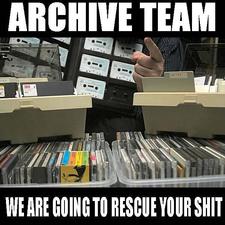Archiveteam Project Collects Lost Web 2.0 Content
Many users keep their emails with webmail services, wedding pictures in photo communities and reading habits with social bookmarking services. What happens, though, when data is lost or websites fold? Archiveteam wants to help in those circumstances.
The Archiveteam wiki provides various assistance so that your personal photo album and other files don't end up in the ether. Assistance includes instructions and documentation about file formats and storage media, much of which are in early phases of development. In a more progressed state is the team's Deathwatch page with a continually updated list of websites that have gone kaput or are about to go that way. Among them, Yahoo's Geocities site and the already closed Furl and Tripod.

Under the rubric Software, the project collects tools, tips and tricks. Included is the GNU wget command that, with some appropriate parameters, secures a complete Wordpress blog on a local hard drive. Some site-specific pages relate to Google, Livejournal and Twitter.
One of the Archiveteam founders is Jason Scott, whose textfiles.com site has been archiving text data off the network from the 1980s and 90s. The young Archiveteam is looking for fellow archivers to write articles and manuals, set up mirror servers and bittorents and form a download task force.
Debian developer Joey Hess has already had thoughts (in a blog) about a GUI program for rescuing Web 2.0 data. Ideally the user would simply enter a list of URLs or a bookmark file and the program would take care of the rest: plugins appropriate to the service or website would handle the work, including a generic one for sites with RSS feeds. Hess is collecting "thoughts, comments, prior art [and] cute program idea names." Some have come his way already.
Subscribe to our Linux Newsletters
Find Linux and Open Source Jobs
Subscribe to our ADMIN Newsletters
Support Our Work
Linux Magazine content is made possible with support from readers like you. Please consider contributing when you’ve found an article to be beneficial.

News
-
Keep Android Open
Google has announced that, soon, anyone looking to develop Android apps will have to first register centrally with Google.
-
Kernel 7.0 Now in Testing
Linus Torvalds has announced the first Release Candidate (RC) for the 7.x kernel is available for those who want to test it.
-
Introducing matrixOS, an Immutable Gentoo-Based Linux Distro
It was only a matter of time before a developer decided one of the most challenging Linux distributions needed to be immutable.
-
Chaos Comes to KDE in KaOS
KaOS devs are making a major change to the distribution, and it all comes down to one system.
-
New Linux Botnet Discovered
The SSHStalker botnet uses IRC C2 to control systems via legacy Linux kernel exploits.
-
The Next Linux Kernel Turns 7.0
Linus Torvalds has announced that after Linux kernel 6.19, we'll finally reach the 7.0 iteration stage.
-
Linux From Scratch Drops SysVinit Support
LFS will no longer support SysVinit.
-
LibreOffice 26.2 Now Available
With new features, improvements, and bug fixes, LibreOffice 26.2 delivers a modern, polished office suite without compromise.
-
Linux Kernel Project Releases Project Continuity Document
What happens to Linux when there's no Linus? It's a question many of us have asked over the years, and it seems it's also on the minds of the Linux kernel project.
-
Mecha Systems Introduces Linux Handheld
Mecha Systems has revealed its Mecha Comet, a new handheld computer powered by – you guessed it – Linux.
